- Home
- John Jakes
North and South Trilogy Page 35
North and South Trilogy Read online
Page 35
Orry continued on across the field. Charles remained motionless, hands clenched at his sides. Like ice melting, the hostility left his face, replaced by a slow, wondering smile. From the ground he retrieved a rammer, a cracked powder horn, and a bag of shot. Then he ran after Orry.
They practiced three hours a day. Orry swore his sisters to secrecy about the duel. Ashton let the cat out anyway. It happened at the dinner table, and Charles was surprised at how upset Clarissa became. Orry pointed out that he was giving Charles instruction and that the boy stood an excellent chance of coming through with a light wound or none.
Tillet agreed with that prediction, making demeaning comments about the character and nerve of Whitney Smith. He wished his nephew well. Altogether, it was an overwhelming experience for Charles. No one had ever taken such an interest in him before.
“No!” was the word Orry uttered most often on the practice field. “You’re not taking long enough to aim. I know fear pushes you to haste. But haste will push you straight into a grave.”
He grabbed Charles’s right arm and shook it. “By God, you’d better remember that. You’ll make a fool of me if you get yourself killed.”
He spoke the last sentence thoughtlessly, not realizing how ridiculous it was until Charles grinned, “Well,” Charles said, “if there’s any reason I wouldn’t want to be killed, that would be it.”
The smile suddenly felt stiff on his lips. Orry was a stern man, a hard taskmaster. By attempting to joke with him, Charles had over stepped. He had been lulled by a change in their relationship these past few days, his resentment of Orry replaced by a kind of brotherly feeling and even an occasional flash of outright affection. Evidently Orry didn’t think he was completely worthless, or he would never have devoted so much time to helping him. But now Charles had gone too far. Orry wasn’t amused.
Suddenly, though, deep in Orry’s matted beard, a glimmer of white appeared. A smile.
“Of course not,” he said, finally realizing the foolishness of his remark. “The devil with saving your life. Save my honor. Save my pride. I am, after all, a Southerner.”
They laughed together, loudly and long. Then Orry touched the gleaming barrel of the Johnson pistol, so well preserved that not a single speck of rust showed on it.
“We won’t accomplish anything cackling like a couple of jays. I’ll count ten. You walk, turn, and hit that limb. Try to do it right this time. We’ve only got two more days.”
A cold snap came. Charles and Orry rose at half past four on the morning of the duel, ate a biscuit apiece and drank coffee, then struggled into overcoats. Since Orry had named the site and the hour, the Smith party would supply the weapons.
They went outside where grooms waited in the dark with their horses. Tillet was there, and Clarissa too; the girls hadn’t been allowed to come down.
Ribbons of mist floated a foot above the ground. It was a dismal morning. Or perhaps the chill was only in his heart, Orry thought as he mounted and waited for good-byes to be said.
Tillet pumped Charles’s hand. Clarissa hugged him. As they walked their mounts down the lane, Orry saw false dawn in the east. Long plumes of mist shot from the nostrils of the horses as they exhaled. Charles cleared his throat.
“Orry?”
“Yes?”
“Whatever happens, I want you to know I appreciate the way you’ve helped me. I never thought anybody cared a hoot about me.”
“All of us care, Charles. You’re a Main. Family.”
He meant it. He was surprised at the way his attitude toward the boy had undergone a transformation in a remarkably short time. Charles had been an eager pupil, done none of that wisecracking that had caused Orry to look down on him before. Of course Charles’s own life was, at stake this time. But Orry thought the change in the young man resulted from more than that. Orry had held out his hand, and Charles had grasped it like a true kinsman. What a pity the change had come at this late hour.
The mist rolled around them. Hundreds of stars pierced the paling sky. Charles drew a deep breath.
“Orry?”
“What?”
“I’m scared as hell.”
“So am I,” Orry said as they turned their horses up the river road.
Daylight was burning off the mist by the time they reached Six Oaks. Orry was annoyed to discover more than twenty men in the Smith party, various male relatives of all ages. At least with that number of spectators there were young men to serve as lookouts along the road and riverbank. Those deputized for the duty protested about missing the action but were quickly overruled.
Orry tethered the horses at the side of the clearing reserved for them. Charles flung off his overcoat, surcoat, waistcoat, and cravat, then rolled up his sleeves. In the shade of a great live oak across the clearing, flawlessly dressed Whitney Smith and others of his clan watched Charles’s preparations with obvious contempt.
Whitney’s kinsman, Smith Dawkins, strutted toward the Mains with a beautiful rosewood gun case, which he opened for their inspection. The .70-caliber weapons were worthy of the box. Each octagonal barrel was half-stocked in polished walnut and had a little ramrod nestling underneath. The pistols were exquisitely tooled and bore the engraved name of a London gunsmith and a date, 1828.
“Satisfactory?” Dawkins inquired.
“I’ll tell you after I inspect them.” Orry pulled one of the guns from its bed of persimmon velvet.
There was a light sheen of sweat on Charles’s forehead. He paced back and forth while the seconds took care of loading the pistols. They handed one to each duelist, then indicated the agreed-upon starting point. Five minutes would be allowed for final preparations.
Charles looked calm. He betrayed his tension only by repeatedly smoothing his palms across the hair at his temples. Orry badly needed to urinate—tension, he presumed—but he didn’t want to leave Charles alone. Especially not with round-faced Whitney Smith and his friend Dawkins smirking and striking poses and whispering jokes about the opponent.
Orry turned his back on them. “I know you’re scared, Charles. But remember this. You have a definite advantage. You’ll see it if you take a good look at that peacock behind me. Appearances being more important to him than mobility, he’s still wearing a heavy coat. Further, he’s too stupid to be frightened, and frightened men are careful men. In battle, Whitney’s kind tend to fall first.”
Charles wanted to answer but could only summon a kind of nervous croak. Orry squeezed his arm. Charles put his hand on top of Orry’s and held it a second.
“Thank you,” he said.
“Gentlemen, are you ready?” Smith Dawkins called. He sounded impatient.
Orry turned smartly. “Ready.”
He walked onto the field, Charles right behind him. The spectators fell silent. A white heron went skating away above the sunlit treetops. At the edge of the clearing, the river flowed golden and peaceful.
Whitney and Charles acknowledged each other with nods; Whitney’s was a nod of dismissal, Orry thought. Up close, eruptions on Whitney’s skin were quite noticeable. Charles, five years younger, looked far more mature and poised. Whitney’s hand trembled as he brought his gun up vertically in front of his face. A good sign—unless Whitney was one of those rare duelists whose aim was actually improved by a bad case of nerves.
Dawkins cleared his throat and addressed the opponents standing back to back with pistols raised. “I shall first pronounce the word begin. This is your signal to start pacing off the distance in time to my count. When you have completed the tenth and final pace, you are at liberty to turn and fire at will. Ready? Begin.”
Charles moved one way, Whitney the other. Orry’s heart began to pound. He drew in a long breath and held it. He and Dawkins quickly retreated to the sidelines. Dawkins stood next to him, counting.
“Three. Four. Five.”
Charles took long, confident strides. Sunlight falling through the trees lit his hair. He has such promise, Orry thought. If only there were
a way to bring it to fruition. If only he lives long enough for someone to try.
“Seven. Eight.”
Sweat greased Whitney’s blotchy face. The trembling had worked its way into his shoulders. Would he shoot or collapse first?
“Nine.”
Charles stared straight ahead. Orry saw the tip of his tongue flick up to lick sweat from his lip, the only outward sign of the anxiety that must be twisting his belly. Orry wanted to shout, “Remember—steady and smooth.”
“Ten.”
Whitney’s knees buckled, but he stayed upright and managed to pivot. He flung his pistol hand out in front of him with all the violence Orry had criticized in Charles that first time in the field. The roar startled Charles. He blinked so hard Orry thought he was hit. Then, from a tree about four feet behind Charles, a branch came tumbling down.
A damp stain appeared on the front of Whitney’s trousers. He executed a clumsy half turn and started to take a step. There were gasps from the spectators and an angry, hissing whisper from Dawkins.
“You must stand, Whitney. Stand!”
He did, but not without a struggle. The humiliating stain widened. He shook so badly the pistol bobbed up and down. Charles slowly extended his arm, took aim, and, with a cool look down the octagonal barrel, fired.
Whitney shrieked like a girl. He twisted to the left and fell, clutching his sleeve. Red showed between his fingers, but Charles had only pinked him. What’s more, he had hit the spot at which he had aimed. Orry ran forward, jubilant.
Whitney passed out with Dawkins kneeling at his side. The spectators broke into applause. Drained of tension, Charles was wandering toward the riverbank in an erratic way. Orry caught him.
“You’ve got to acknowledge that applause. It’s for you.”
The young man stared at Orry, thunderstruck. Then he looked at the Smith relatives. It was true. They were applauding his marksmanship, his courage, and his generosity in wounding Whitney when he could have killed him. All the characteristics of a true Carolina gentleman, Orry thought, almost dizzy with happiness.
Charles saluted the spectators with his pistol. But he couldn’t yet believe what had happened.
“I have to thank you again,” Charles said as they rode homeward. Mild sunshine between the trees put bars of light and shadow on the road. Both men found the late-winter day a glorious one on which to be alive.
“You did it yourself, Charles.”
“No, sir. Without you, I’d be lying dead back there.” He smiled and shook his head. “My Lord, you don’t know how it felt to hear those men clapping for me instead of their own kinsman.”
“Who unfortunately showed himself a coward. All bluster, no substance. They didn’t like that.”
“Well, I can’t get over it. I never will. I do have one question about—”
He stopped. Orry waited, but Charles said nothing more. Orry pointed ahead to a roadside hovel with a weathered sign hanging crookedly on the front. “Do you know that place? It’s a poor excuse for a tavern, but the man does keep a stock of passable whiskey. I think we both deserve a drink. Shall we stop?”
“By all means.” Charles grinned and galloped ahead.
The landlord goggled when his visitors ordered ardent spirits at half past seven in the morning. Orry’s money quickly curtailed any objections or questions. The hovel smelled, so the two drinkers sat on the front stoop in the sunshine.
Orry swallowed half his whiskey, shivered, and blinked pleasurably. Then he said, “Earlier you started to ask a question.”
“Yes. Whenever I got into a fight before, people disapproved. You included. Why was it different this morning? We were doing a hell of a lot more than punching each other. Why didn’t anyone object?”
Orry studied Charles, wanting to learn if the young man was having some kind of sarcastic sport. He saw no sign of it. Charles had asked a serious question. An important one, too.
Orry wanted his answer to be right. He thought about it, then tossed off the rest of his liquor and clapped Charles on the shoulder.
“I think I can answer you best back at Mont Royal.”
“I don’t understand.”
But Orry was already swinging up into the saddle. “Come on.”
Tillet, Clarissa, and the girls rushed outside the moment they spied the horses in the lane. An inevitable delay followed as the spellbound listeners heard Orry’s tale. Tillet offered enthusiastic congratulations, Clarissa sobbed with relief, and the girls jumped up and down and begged to hear Orry describe Charles’s cool bravery a second time. All in all it took about an hour. Only then did Orry draw his cousin into the dim library and point to the clothes stand bearing his uniform coat and sword.
“There’s your answer.”
Charles looked baffled. “I don’t know what you mean.”
“Consider men who go to war. What do they do?”
“Fight.”
“Yes, but more than that, they do so in a manner understood and agreed upon beforehand. Fierce as it may be, there is a code of conduct among honorable men who fight. Those Smiths applauded you not simply because you won but because you observed the rules. Whitney didn’t. He tried to step away from your bullet. You saw the reaction. Before this, you never fought by the rules. That’s the difference.”
Orry lifted the left sleeve of the coat. “The world doesn’t necessarily condemn the man who loves a battle. It encourages and rewards some of them. Even a gallant loser may get a share of the glory when the history books are written. I’m not sure it’s altogether right to encourage and reward fighting and killing, but that’s the way things are. Have I answered you?”
Charles nodded slowly, gazing at the scabbard, the brass buttons, the dark blue coat as if they were imbued with a religious significance. What Orry had just said came as a revelation.
Orry began to rummage in a cabinet. “There’s whiskey here. I don’t know about you, but I’m still thirsty as sin.”
“So am I.”
Charles walked around to the other side of the stand, never taking his eyes from the uniform. Orry too was swept up by a revelation. He saw Cousin Charles in a totally new light.
He may not be lost after all. Look at him staring at that uniform. He’s fascinated.
Starting that very morning, he took Cousin Charles in hand.
He began with small readjustments. Mild, almost diffident suggestions about appearance. Manners. Regular hours. Nothing too important or demanding at first because he expected rebellion. Instead, he got instantaneous and dramatic compliance. Charles began to show up for every meal, his face and hands scrubbed, his shirttail tucked in, and no bowie knife at his belt.
Three weeks after the duel, Orry offered Charles a couple of books, which he urged him to read. Orry had chosen easy works: light-historical romances by William Gilmore Simms, a South Carolinian who was almost as popular as Fenimore Cooper had been in his day. The speed with which Charles finished the novels convinced Orry that the young man was exceptionally intelligent—something Clarissa had said for years. Orry had never believed her.
Next, Orry gave his cousin short lessons in some of the social conventions: courtesies to be accorded to ladies, what constituted proper attire for different kinds of public and family functions. Charles not only paid attention; he began to put some of the principles into action. He was soon treating Ashton and Brett with a new politeness that flabbergasted them. But they enjoyed it because Charles was handsome and carried off the courtly flourishes with hardly a trace of awkwardness.
“The boy’s a born cavalier,” Orry exclaimed to Madeline at their next meeting. “He puts me to shame. He’s graceful, charming—and what’s more, it comes naturally to him. Where has he been hiding that side of his character?”
“Under a layer of dirt and resentment, probably,” she said with a gentle smile.
“I expect you’re right. The transformation’s incredible. All it took for him to come into his own was a little affection from his family.”<
br />
“From you, principally. Even at Resolute they’re gossiping about the change. Nancy told me Charles follows you everywhere.”
“All day long. Like a puppy! It’s embarrassing.” But Orry’s expression said he really didn’t mind the hero worship. “Trouble is, you solve one problem and the solution creates another.”
“What now? You’ve been saying Charles is straightening out—”
“That’s exactly what I mean. He is. Before, I was positive he’d wind up dead in some ditch after a brawl or a horse race. Now I’m wracking my brain to figure out what he should do with his life. I must suggest something, and soon.”
“You sound like a father.”
“Don’t joke. It’s no small responsibility.”
“Of course it isn’t. I wasn’t joking. I was smiling because you’re happy. I’ve never seen you in such good spirits. You like the responsibility.”
He looked at her. “Yes. I do.”
After supper every night, if Orry had no work in the office, he and Charles would take a whiskey together in the library. Sometimes Tillet joined them, but if so, he was a silent participant. Silent and amazed. He knew something positive and wholesome had happened in the relationship between his son and his nephew. He didn’t want to interfere. He also realized that, in spirit and in fact, Orry was fast becoming the head of the family. Tillet resented that more than a little. Yet it pleased him, too. Cousin Charles was reserved when Tillet was present. When he wasn’t, the young man couldn’t hear enough about Orry’s experiences as a cadet.
“You really liked it at West Point?”
“Well, not completely. But I made several good friends—and I met my best friend there.”
“George.” When Orry nodded, Charles asked, “Did you want to stay in the Army?”
“Very much. General Scott, however, has this unreasonable prejudice against any officer with just one arm. Maybe it’s because he still has two.”
Charles smiled. It wasn’t much of a jest, but he realized that never before had Orry been able to make light of his injury. It was a remarkable change.

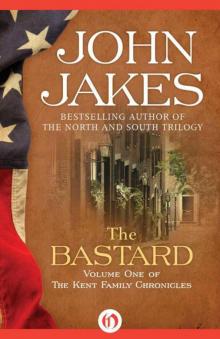 The Bastard
The Bastard The Furies
The Furies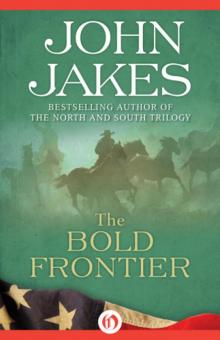 The Bold Frontier
The Bold Frontier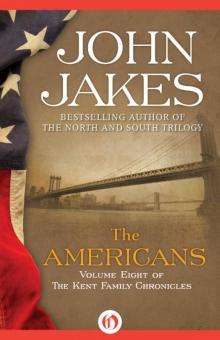 The Americans
The Americans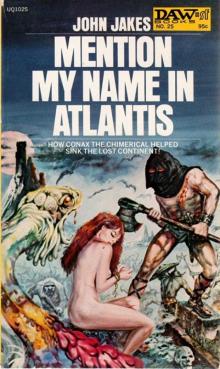 Mention My Name in Atlantis
Mention My Name in Atlantis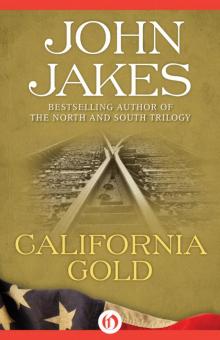 California Gold
California Gold North and South
North and South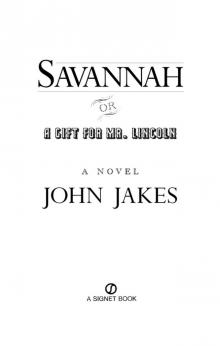 Savannah, or a Gift for Mr. Lincoln
Savannah, or a Gift for Mr. Lincoln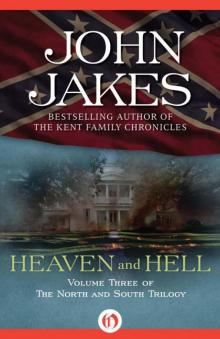 Heaven and Hell
Heaven and Hell Homeland
Homeland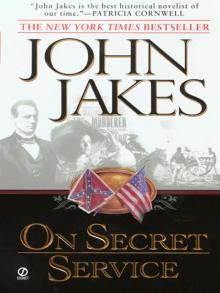 On Secret Service
On Secret Service The Lawless
The Lawless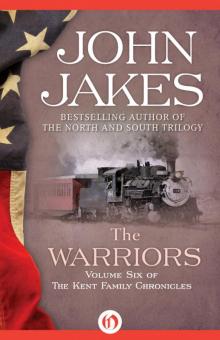 The Titans
The Titans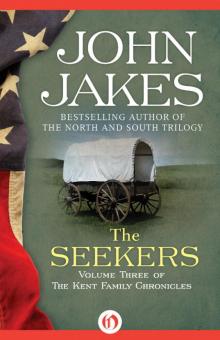 The Seekers
The Seekers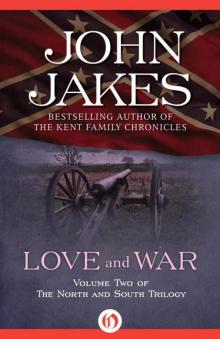 Love and War
Love and War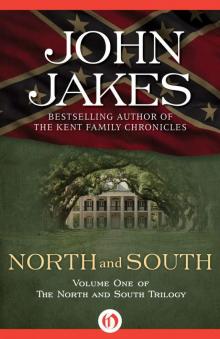 North and South: The North and South Trilogy (Book One)
North and South: The North and South Trilogy (Book One)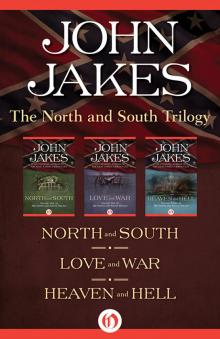 North and South Trilogy
North and South Trilogy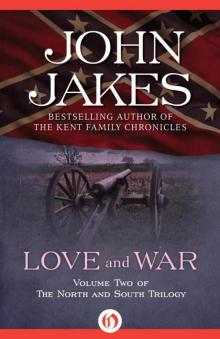 Love and War: The North and South Trilogy
Love and War: The North and South Trilogy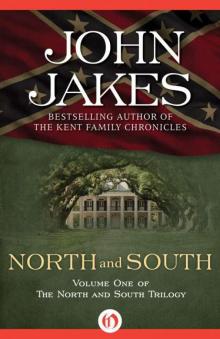 North and South: The North and South Trilogy
North and South: The North and South Trilogy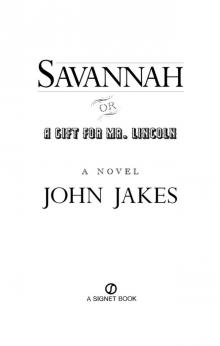 Savannah
Savannah Lawless
Lawless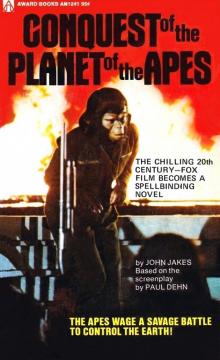 Conquest Of The Planet Of The Apes
Conquest Of The Planet Of The Apes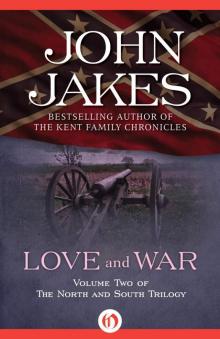 Love and War: The North and South Trilogy (Book Two)
Love and War: The North and South Trilogy (Book Two)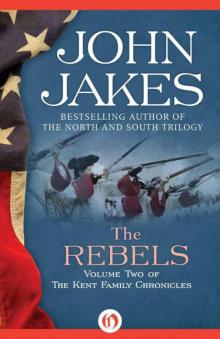 The Rebels: The Kent Family Chronicles
The Rebels: The Kent Family Chronicles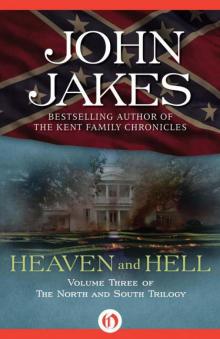 Heaven and Hell: The North and South Trilogy
Heaven and Hell: The North and South Trilogy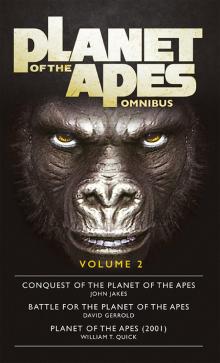 Planet of the Apes Omnibus 2
Planet of the Apes Omnibus 2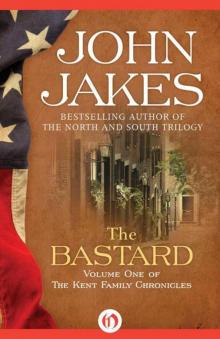 The Bastard: The Kent Family Chronicles
The Bastard: The Kent Family Chronicles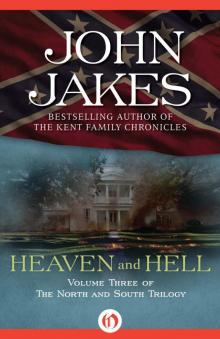 Heaven and Hell: The North and South Trilogy (Book Three)
Heaven and Hell: The North and South Trilogy (Book Three)